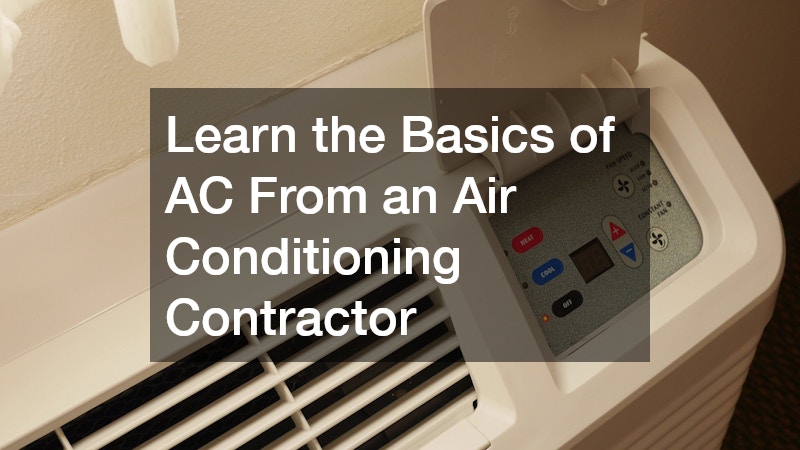Understanding air conditioning (AC) systems is essential for maintaining comfort in your home or office. Demystify AC systems by learning the answers to some of the most frequently asked questions, as explained by an air conditioning contractor. Whether you’re looking to install a new system or just want to better understand the one you have, knowing the basics can greatly enhance your experience.
What Are the Different Types of Air Conditioning Systems?
There are several types of air conditioning systems, each with its own set of advantages and disadvantages. Central air systems are the most common in larger homes, providing uniform cooling through a network of ducts. These systems typically offer quiet operation and can handle substantial cooling loads effectively.
Ductless mini-split systems have gained popularity for their flexibility, making them suitable for homes without ductwork. They offer zoned heating and cooling, allowing you to control the temperature in individual rooms. Additionally, these systems are often more energy-efficient than traditional central systems.
Window units are a cost-effective solution for cooling single rooms or small spaces. They are easy to install and can be removed seasonally, offering the advantage of portability. However, they may not provide the same level of efficiency as more comprehensive systems. Homeowners should weigh their options based on space, budget, and cooling needs when choosing the right type of AC system.
How Does an Air Conditioner Work?
At the heart of every air conditioning system lies the refrigeration cycle, a crucial process that allows for heat removal from indoor air. This cycle involves several key components, including the compressor, evaporator, condenser, and expansion valve. Together, these components work to dissipate heat and deliver cool air to living spaces.
The compressor serves as the system’s pump, circulating refrigerant gas through the system. As the refrigerant moves, it absorbs indoor heat and subsequently expels it outside. This continuous cycle not only cools the air but also helps to control humidity levels, creating a more comfortable indoor environment.
Understanding the mechanics of how an air conditioner works can be empowering. By recognizing the role of each component, you can better appreciate the importance of routine maintenance and troubleshooting, ensuring your system operates efficiently and reliably throughout the cooling season.
What Is the Importance of Regular Maintenance for AC?
Regular maintenance is crucial for the longevity and efficiency of air conditioning systems. Over time, dirt and debris can accumulate in filters and coils, leading to reduced airflow and increased energy consumption. Keeping your AC system clean helps maintain performance, ensuring that it operates at peak efficiency.
Routine service can also prevent minor issues from escalating into costly repairs. During a maintenance visit, a contractor will inspect and service the various components, addressing potential problems before they become serious. This proactive approach helps extend the life of your system, saving you money in the long run.
Additionally, regular maintenance ensures that your system operates safely. Issues like refrigerant leaks or electrical problems can pose health and safety risks. By committing to a schedule of routine check-ups, homeowners can enjoy peace of mind knowing their AC systems are in good working order.
How Do You Choose the Right Size Air Conditioner for Your Space?
When selecting an air conditioner, size matters significantly. An improperly sized unit can lead to inefficiency and discomfort. If an air conditioner is too small, it will struggle to cool the space adequately, while an oversized unit may cool too quickly, leading to humidity issues and temperature fluctuations.
The cooling capacity of air conditioners is measured in BTUs (British Thermal Units). To determine the right size for your space, you’ll need to calculate the square footage and consider factors such as ceiling height, insulation, and window size. The more accurately you can measure your space, the more effectively you can choose an appropriately sized unit.
Consulting with an experienced air conditioning contractor can also provide valuable insights into sizing your AC system. They can perform a detailed load calculation, ensuring that you select a unit that will offer maximized efficiency and comfort tailored to your specific needs.
What Common Problems Do Air Conditioners Have?
Air conditioning systems can experience a range of common issues that may affect their performance and efficiency. One of the most frequent complaints includes insufficient cooling, often caused by dirty filters, low refrigerant levels, or malfunctioning components. Diagnosing these problems early can prevent further damage to the system.
Another frequent issue is the inconsistency in airflow from vents. This can be due to blockages in the duct system, faulty dampers, or motor issues. Regular inspections can help identify any underlying problems, ensuring optimal air distribution throughout your space.
Lastly, strange noises or smells emanating from your air conditioning unit can indicate mechanical or electrical issues. Immediate attention from a qualified air conditioning contractor can help address these potential safety hazards while restoring your system’s functionality.
By understanding these essential aspects of air conditioning, homeowners can make informed decisions when it comes to purchasing, maintaining, and troubleshooting their AC systems. Armed with knowledge about the different types of systems, their operation, and the importance of maintenance, you can enhance both comfort and efficiency in your home. Whether you’re selecting a new unit or addressing existing issues, the insights offered in this article aim to empower you on your journey with air conditioning.

